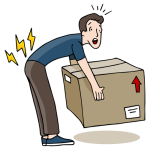Present day lifestyle has lead to a tremendous increase in the time spent in sitting position by millions of people during work hours, during travel and at home.
Sitting for a long time everyday is now known to be injurious to health. It increases risk of developing diabetes, heart diseases, depression and cancer, with an increase in all-cause mortality.
An average person with a desk job spends at least 8 – 10 hours in sitting position in a day. Back or neck pain is one of the most common symptoms experienced by those who spend a lot of hours sitting everyday.
Prolonged sitting affects the muscles, ligaments, discs and joints of the spine.
Inactivity leads to weakens the spinal and abdominal muscles and gluteal muscles reducing the core strength. The hip flexors and hamstring muscles become shortened and lead to stiffness and thereby increase the strain on the lower back.
Bad postures while sitting include slouching forwards or hunching, sliding to the edge of the chair and leaning back too much. Neck bent to look down or too high while looking at the computer screen is another example. All of these lead to chronic repetitive overstrain on the trunk muscles and structures in the spine that can cause significant back, neck or shoulder pain.


Prolonged use of mobile phones is usually associated with forward flexion of the neck and leads to overstrain of spinal and shoulder muscles. This is one of the leading causes of upper back, neck and shoulder pain now-a-days. (Text-neck).
The lumbar discs are subjected to high pressures while sitting, especially in bad posture. This may lead to accelerated degeneration of the discs leading to increased risk of disc prolapse and related problems.
Weight gain is an eventual outcome of sedentary lifestyle and the added kilos contribute to the overstrain on the spine and increase the risk of developing chronic back pain.
So, if you are a computer professional suffering from chronic back or neck pain, then the following measures will surely help you get better or prevent spinal pain:
Maintain good spinal posture during all the daily routine activities including household chores, sitting at work, bending and lifting weights, travelling etc. Adequate back support and maintaining head and neck in alignment with the back while sitting at work are important points to remember and practice. Choose ergonomic chairs with adequate back support, thigh support, adjustable height and arm rests. It is important to get out of chair and walk or stretch your back muscles every half an hour. Learn and practice the right way of bending and lifting weights without hurting your back.
Make good posture a habit !. Be aware of your posture and keep correcting yourself until it becomes a habit !.


Strengthening the spinal muscles, abdominal muscles and improving the core strength is an important factor for preventing frequent spinal pain. Those with long duration sitting jobs, women after child birth, old women and men are likely to have weaker core strength that leads to spinal pain.
Make exercise a habit !. Exercise regularly to improve the core strength and strengthen the muscles of the back as well as the neck and shoulders.

It is during the sleep that the spine recovers from the entire days stresses. The spinal muscles are continuously working the entire day when we are in an upright posture. They need adequate duration of rest to recover overnight to be ready for the next day. The discs in the spine loose some water during the day when they are loaded. It is when we sleep and rest that the discs recover the lost water pressure in them. If the sleep duration is inadequate, over a period of time, the repetitive stresses lead to muscle fatigue and also may accelerate disc degeneration.
Sleep adequately !. At least 7 hours of sleep is necessary for the spine to stay healthy.

Adequate water intake is essential to prevent dehydration. The function of the discs in the spine depends on its ability to retain enough water in its matrix. Loss of this ability is the first step towards disc degeneration and related problems.
A balanced diet rich in calcium and vitamin D is essential for muscle and bone strength. Vitamin D deficiency is very common in our population due to lack of adequate sunlight exposure and poor diet habits.
Low vitamin D is associated with increased risk of falls in the elderly, as it affects the muscle co-ordination. Loss of calcium from bones leads to osteoporosis which in turn leads fractures and also results in acceleration of disc degeneration.
Get some sunlight, eat healthy and hydrate yourself well.!


The only factor that is proven to lead to early disc degeneration, apart from genetic composition, is tobacco smoking !. The discs in the spine do not have their own blood supply and they depend on the adjacent vertebral body for oxygen, glucose and other essential nutrients.
Smoking results in reduced blood supply to the vertebral bodies and this affects the permeation of nutrients into the discs, setting off an acceleration of disc degeneration and related problems.
Smokers are also at a significantly higher risk of osteoporosis.
So if you are a smoker, quit now!!.

These 5 habits can help minimise the chances of significant back or neck pain troubling you by taking care of the most common causes. There could be other causes of spinal pain and if symptoms persist or keep recurring, see your doctor for further evaluation.
If you liked the article, please share it and subscribe to my future articles on spine problems. Thank you.!

With years of experience in spine surgery, Dr Phani Kiran S, Senior Consultant Spine Surgeon will assess you and suggest the treatment option that is right for you.
We at Medspine clinics, understand the importance of educating all our patients about the spinal problems and the most effective ways to take care of their spine.
The Ortho Clinic: Monday, Wednesday, Friday, Saturday.
Ojas Health: Tuesday, Thursday
© Copyright 2024 MedSpine. All Rights Reserved. Build with 🤍 by Digital GYB
WhatsApp us